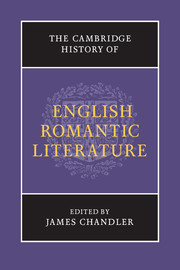Book contents
- Frontmatter
- Introduction
- Part I The Ends of Enlightenment
- Part II Geographies: The Scenes of Literary Life
- Part III Histories: Writing in the New Movements
- 15 Rebellion, revolution, reform: the transit of the intellectuals
- 16 Changes in the world of publishing
- 17 The new poetries
- 18 Romanticism and poetic autonomy
- 19 Transformations of the novel – I
- 20 Transformations of the novel – II
- 21 Theatre, performance and urban spectacle
- 22 The epigenesis of genre: new forms from old
- 23 The literature of the new sciences
- 24 The making of child readers
- Part IV The Ends of Romanticism
- Chronology
- Bibliographies
- Index
- 1 A New Pocket Map of the Cities of London and Westminster; with the Borough of Southwark, Comprehending the new Buildings and other Alterations, 3rd edn (London: William Faden, 1790).">
- References
21 - Theatre, performance and urban spectacle
from Part III - Histories: Writing in the New Movements
Published online by Cambridge University Press: 28 May 2009
- Frontmatter
- Introduction
- Part I The Ends of Enlightenment
- Part II Geographies: The Scenes of Literary Life
- Part III Histories: Writing in the New Movements
- 15 Rebellion, revolution, reform: the transit of the intellectuals
- 16 Changes in the world of publishing
- 17 The new poetries
- 18 Romanticism and poetic autonomy
- 19 Transformations of the novel – I
- 20 Transformations of the novel – II
- 21 Theatre, performance and urban spectacle
- 22 The epigenesis of genre: new forms from old
- 23 The literature of the new sciences
- 24 The making of child readers
- Part IV The Ends of Romanticism
- Chronology
- Bibliographies
- Index
- 1 A New Pocket Map of the Cities of London and Westminster; with the Borough of Southwark, Comprehending the new Buildings and other Alterations, 3rd edn (London: William Faden, 1790).">
- References
Summary
The theatre world of the English Romantic period gives us phenomenal access to the fantasies and daily realities of a people living through one of the Western world’s most revolutionary periods. The content of what is presented on stage, the manner and places of its presentation, the types of person creating it, and commentary on its reception all provide extraordinary access to cultural ferment in the period and insight into how a people processes current events through theatrical means. Even the legal terminology that designates London theatrical scenes in this period – legitimate vs. illegitimate theatre – suggests an artistic forum in transition. It also accurately suggests how politics is addressed through aesthetic media. This is in large part because what animates theatrical discussion is debate over national representation, a concern deepened by reflections on the French Revolution and the abolition of slavery with their impassioned descriptions of what and who best represent ‘the English’ in an emerging democracy.
While concerns over representation emerge in discussions of all forms of art in this period (and in all periods of art), they are particularly salient in descriptions of Romantic theatre. At once aesthetic form and social forum, theatre requires an elaborate coordination of artistic, financial, technical and audience demands that, in this period, is distinguished by two pressures. First, each of these domains is not only in enormous flux but is also described as being so in ways that dramatize clashes between established and innovative or radical interests.
Keywords
- Type
- Chapter
- Information
- The Cambridge History of English Romantic Literature , pp. 490 - 506Publisher: Cambridge University PressPrint publication year: 2009
References
- 1
- Cited by



